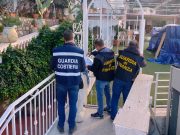Dismantled a network dedicated to committing scams against insurance companies. Involved doctors, lawyers, and business procurers. The carabinieri of the Investigative Unit of the Aversa Group and the Nas of Caserta have carried out precautionary measures, issued by the judge of the Court of Santa Maria Capua Vetere, at the request of the local Public Prosecutor’s Office, against 23 suspects (22 under house arrest and one under an obligation to report), all residents in the provinces of Caserta and Naples. A total of 504 people are under investigation.
The recipients of the measures – Under house arrest: Antonio Abatiello, 46 years old from Casal di Principe; Emilio Acunzo, 59 years old from Caserta; Emilio Baldascino, 38 years old from Casal di Principe; Antonio Paolo Caterino, 44 years old from Casal di Principe; Carmine D’Aniello, 38 years old from Casal di Principe; Raffaella D’Aniello, 35 years old from Casal di Principe; Carmine De Simone, 39 years old from Naples; Flavia Davide, 39 years old from Castel Volturno; Antonietta Dello Margio, 36 years old from Casal di Principe; Gianluca Di Sarno, 40 years old from San Marcellino; Guglielmo Di Sarno, 48 years old from Casavatore; Domenico Fiorito, 65 years old from San Nicola La Strada; Patrizia Intorto, 44 years old from Caserta; Antonio Letizia, 52 years old from Capodrise; Adriana Mottola, 40 years old from Casal di Principe; Angelo Palmiero, 54 years old from Marcianise; Gianluca Piazza, 39 years old from Casal di Principe; Gennaro Rondinone, 63 years old from Lusciano; Patrizia Rubino, 48 years old from Casal di Principe; Gianni Russo, 38 years old from Casal di Principe; Salvatore Salvemini, 59 years old from Santa Maria Capua Vetere; Massimo Vaio, 54 years old from Naples. Obligation to report to the judicial police for Giulio Puzzi, 46 years old from San Cipriano d’Aversa.
“Old” fractures, fake documents and medical reports – Investigators have reconstructed the existence of a criminal association aimed at committing a significant number of episodes of corruption, forgery, fraud, corruption in judicial acts, production and use of counterfeit documents in order to obtain money improperly as compensation from insurance companies, in the face of road accidents that never actually occurred. During the complex investigation, it was found that the association used to have subjects with previous fractures brought to various emergency rooms, who, declining false personal data and presenting counterfeit documents previously delivered by complacent subjects, obtained medical reports attesting to injuries. These reports were later used to file claims for damages with various insurance companies for accidents that never actually occurred.
Compliant doctors in hospitals in Marcianise and Maddaloni – The organization also used to send perfectly healthy individuals to the emergency rooms of hospitals in Marcianise and Maddaloni, for whom compliant doctors, for a fee, issued false emergency room reports attesting to personal injuries. These reports, issued outside the normal completion and telematic registration procedures provided by the Health Authority, were subsequently declared compliant by a nurse in charge of the medical records of the Health Directorate of the hospital in Marcianise, in order to bypass the checks carried out by investigative agencies appointed by the insurance companies involved, and thus obtain the undue payment of the sums paid as compensation for damages.
False invoices for therapy cycles – It was also reconstructed that the members of the organization, in support of the compensation claim, used medical documentation drawn up by compliant doctors working in public and private healthcare facilities accredited by the National Health Service. In support of the compensation claims, diagnostic tests were also used, drawn up on letterhead paper from diagnostic centers, results lacking in terms of health authorization, and addressed to alleged figureheads. In some circumstances, in support of the medical documentation, a person, despite not being a physiotherapist, provided the group with false invoices attesting to the performance of physiotherapy cycles, all to support the compensation claim and give it greater value, inflating the amounts reimbursed.
Seizures in studios in Qualiano and Casal di Principe – Precautionary seizures were carried out against two doctors involved, amounting to over 600,000 euros in total, partly found in cash during home searches, considered proceeds of illegal activities. Over 1,700 irregular medical certificates were acquired from the hospital in Marcianise and from the archives of the C.S.A. Consortium of Cancello Arnone (a company that manages the archiving of medical documentation on behalf of the Local Health Authority). Finally, a diagnostic center in Qualiano (Naples) and related diagnostic equipment, as well as a physiotherapy center in Casal di Principe, were subjected to precautionary seizure.
“Scams produce higher costs for citizens” – The Public Prosecutor’s Office had initially requested 54 precautionary measures, but after the judge’s interrogations carried out based on the so-called Nordio Law, 23 precautionary measures were issued. 17 suspects were also charged with participating in a criminal association aimed at committing fraud. “This investigation into insurance scams has revealed a glimpse of profound and systemic illegality that then affects citizens, forced to pay very high premiums,” said prosecutor Pierpaolo Bruni at a press conference.
“Province of Caserta third in Italy for highest premiums” – “Caserta – explained the provincial commander of the Carabinieri, Colonel Manuel Scarso – is the third province in Italy in terms of paying the highest insurance premiums, and this is precisely due to the high number of reported accidents, a large part of which unfortunately are false. The ones who pay for these illegal activities are therefore the companies but above all the citizens.” Scarso spoke of the involvement in the investigation of “many unsuspecting white-collar workers, in particular doctors, who should carry out a profession in support of people; in this case, this did not happen.” An investigation that has already produced a positive effect, as the Ania – National Association of Insurance Companies has called the companies to discuss possible countermeasures and reduce premiums.




























